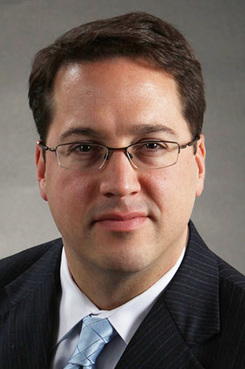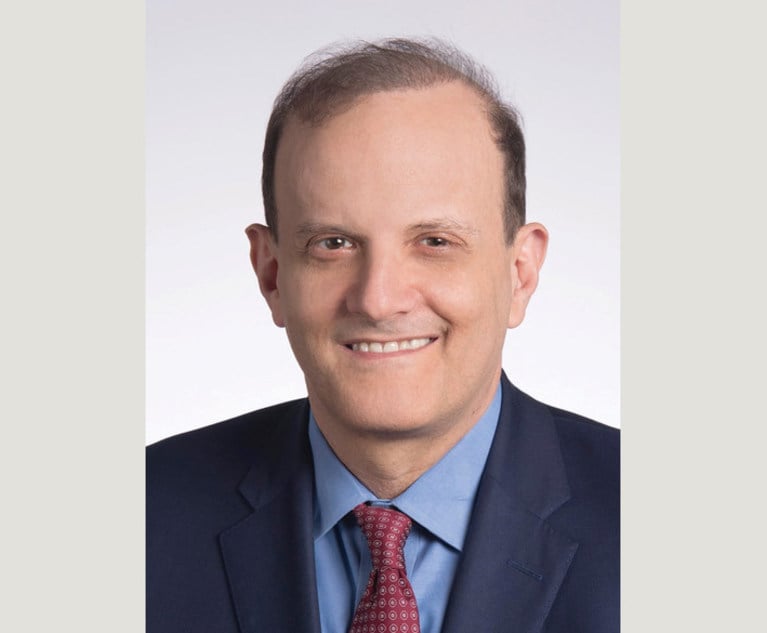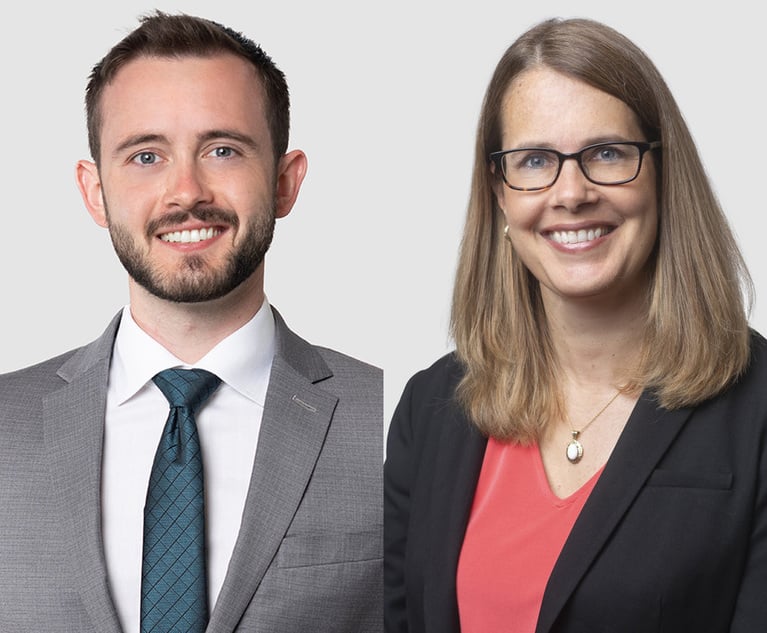Sincerely Held Secular Beliefs Do Not Qualify for Religious Exemption From Flu Shot Policy
Employers that mandate flu vaccinations should be sure to allow employees to request exemptions to their flu shot policies for medical reasons, including but not limited to, allergies to the vaccine or its components or a history of Guillain-Barré syndrome.
November 08, 2018 at 04:07 PM
6 minute read
By Stephen A. Antonelli
 Stephen A. Antonelli, Babst Calland Clements & Zomnir
Stephen A. Antonelli, Babst Calland Clements & ZomnirIt's that time of year again. The days are getting shorter, the weather is getting colder, and families are starting to think about the menu for their Thanksgiving dinners.
And I still haven't gotten my flu shot.
It's on my to-do list, I promise. It's not that I don't like going to the doctor, or that I am particularly afraid of needles, but when it comes to the flu shot, for some reason, I tend to procrastinate. Some employees who work in the health care industry do not have the option of procrastinating when it comes to getting a flu vaccine because their employer requires them to be vaccinated.
The Center for Disease Control (CDC), the Advisory Committee on Immunization Practices (ACIP), and the Healthcare Infection Control Practices Advisory Committee (HICPAC) recommend that all U.S. health care workers get vaccinated annually against influenza. This recommendation applies to physicians, nurses, nursing assistants, therapists, technicians, emergency medical service personnel and anyone potentially exposed to infectious agents that can be transmitted to and from health care workers and patients. As a result, many health care employers require their employees to get vaccinated annually.
Employers that mandate flu vaccinations should be sure to allow employees to request exemptions to their flu shot policies for medical reasons, including but not limited to, allergies to the vaccine or its components or a history of Guillain-Barré syndrome. Employers should also allow an exemption to employees with sincerely held religious beliefs that conflict with receiving the vaccination. Employers may then require employees who have been granted an exemption to wear a mask when interacting with patients or coworkers. Not surprisingly, mandatory flu vaccinations policies have been the subject of litigation, including several cases filed by the Equal Employment Opportunity Commission (EEOC).
Near the end of 2017, in Fallon v. Mercy Catholic Medical Center of Southeast Pennsylvania, 877 F.3d 487 (3d Cir. 2017), the U.S. Court of Appeals for the Third Circuit issued an opinion on the issue of whether an employer violated Title VII of the Civil Rights Amendment when it terminated an employee who declined a mandatory flu vaccine for sincerely held moral and ethical—but not religious—beliefs.
Paul Fallon was employed as a psychiatric intake worker with Mercy Catholic Medical Center. Fallon lost his job in 2014 because he refused to get a flu shot. Like many health care employees, Mercy Catholic required its employees to either obtain a flu vaccine, or to seek a medical or religious exemption from its policy. It also required its employees who had been granted an exemption to wear masks as an accommodation.
Fallon challenged Mercy Catholic's policy by declining a flu shot. In support, Fallon cited to several of his sincerely held beliefs. For instance, Fallon believes that one should not “harm” his own body and that the flu vaccine “may do more harm than good.” Fallon also claimed that he would have violated his own conscience had he adhered to Mercy Catholic's flu vaccine policy.
Fallon requested a religious exemption and in support thereof, cited his sincerely held beliefs. Mercy Catholic rejected his request and requested a letter from a member of Fallon's clergy that explained his position. Fallon did not provide a letter from his clergy because he does not belong to a religious organization. Despite the denial of his request for a religious exemption, Fallon continued to violate the policy. As a result, Mercy Catholic suspended and then terminated his employment. Fallon filed suit against Mercy Catholic claiming religious discrimination. Specifically, Fallon claimed that Mercy Catholic violated Title VII of the Civil Rights Act because it failed to accommodate his sincerely held beliefs.
To establish religious discrimination, an employee must show that: he held a sincere religious belief that conflicted with a job requirement; he informed his employer of the conflict; and he was disciplined for failing to comply with the conflicting requirement. In this case, the second and third elements of Fallon's claim were clear. The crucial issue was whether Fallon's beliefs were sincerely held religious beliefs. According to the U.S. District Court for the Eastern District of Pennsylvania and the Third Circuit, they are not. The district court granted Mercy Catholic's motion to dismiss and the Third Circuit affirmed in a precedential opinion.
In its opinion, the Third Circuit had to confront the “particularly difficult” task of determining whether Fallon's beliefs required the protection of Title VII. The court relied on its own precedent in Africa v. Commonwealth of Pennsylvania, 662 F.2d 1025 (3d Cir. 1981) to determine the definition of religion.
According to the court, a religion:
- Addresses fundamental and ultimate questions having to do with deep and imponderable matters;
- Is comprehensive in nature in that it consists of a belief system as opposed to an isolated teaching; and
- Can often be recognized by the presence of certain formal and external signs, see Fallon, 877 F.3d at 491 (citing Africa, 662 F.2d at 1032).
Fallon's beliefs do not appear to address “fundamental and ultimate questions having to do with deep and imponderable matters, nor are they comprehensive in nature.” Instead, he is merely worried about the health effects of the flu vaccine. In short, his concern was “a medical belief, not a religious one.”
Despite denying Title VII protection to Fallon's beliefs, the court noted other courts have reached similar conclusions on the issue of whether certain anti-vaccination beliefs are not religious. It also noted, however, that anti-vaccination beliefs could be part of a broader religious faith and therefore may constitute a sincerely held religious belief. The court pointed out, for example, that Christian Scientists regularly qualify for exemptions from vaccination requirements, “In those circumstances, they are protected.”
Health care employers who require their employees to get vaccinated against influenza should be mindful of the rationale in support of employees' requested exemptions. Employers should be sure to evaluate each requested exemption carefully and individually.
Stephen A. Antonelli is a shareholder and chair of the employment and labor group of Pittsburgh law firm Babst Calland Clements & Zomnir. His practice includes representing employers in labor and employment and general litigation matters.
This content has been archived. It is available through our partners, LexisNexis® and Bloomberg Law.
To view this content, please continue to their sites.
Not a Lexis Subscriber?
Subscribe Now
Not a Bloomberg Law Subscriber?
Subscribe Now
NOT FOR REPRINT
© 2025 ALM Global, LLC, All Rights Reserved. Request academic re-use from www.copyright.com. All other uses, submit a request to [email protected]. For more information visit Asset & Logo Licensing.
You Might Like
View All

Essential Labor Shifts: Navigating Noncompetes, Workplace Politics and the AI Revolution


Employment Law Developments to Expect From the Second Trump Administration
8 minute readTrending Stories
- 1Supreme Court Takes Up Challenge to ACA Task Force
- 2'Tragedy of Unspeakable Proportions:' Could Edison, DWP, Face Lawsuits Over LA Wildfires?
- 3Meta Pulls Plug on DEI Programs
- 4On the Move and After Hours: Meyner and Landis; Cooper Levenson; Ogletree Deakins; Saiber
- 5State Budget Proposal Includes More Money for Courts—for Now
Who Got The Work
Michael G. Bongiorno, Andrew Scott Dulberg and Elizabeth E. Driscoll from Wilmer Cutler Pickering Hale and Dorr have stepped in to represent Symbotic Inc., an A.I.-enabled technology platform that focuses on increasing supply chain efficiency, and other defendants in a pending shareholder derivative lawsuit. The case, filed Oct. 2 in Massachusetts District Court by the Brown Law Firm on behalf of Stephen Austen, accuses certain officers and directors of misleading investors in regard to Symbotic's potential for margin growth by failing to disclose that the company was not equipped to timely deploy its systems or manage expenses through project delays. The case, assigned to U.S. District Judge Nathaniel M. Gorton, is 1:24-cv-12522, Austen v. Cohen et al.
Who Got The Work
Edmund Polubinski and Marie Killmond of Davis Polk & Wardwell have entered appearances for data platform software development company MongoDB and other defendants in a pending shareholder derivative lawsuit. The action, filed Oct. 7 in New York Southern District Court by the Brown Law Firm, accuses the company's directors and/or officers of falsely expressing confidence in the company’s restructuring of its sales incentive plan and downplaying the severity of decreases in its upfront commitments. The case is 1:24-cv-07594, Roy v. Ittycheria et al.
Who Got The Work
Amy O. Bruchs and Kurt F. Ellison of Michael Best & Friedrich have entered appearances for Epic Systems Corp. in a pending employment discrimination lawsuit. The suit was filed Sept. 7 in Wisconsin Western District Court by Levine Eisberner LLC and Siri & Glimstad on behalf of a project manager who claims that he was wrongfully terminated after applying for a religious exemption to the defendant's COVID-19 vaccine mandate. The case, assigned to U.S. Magistrate Judge Anita Marie Boor, is 3:24-cv-00630, Secker, Nathan v. Epic Systems Corporation.
Who Got The Work
David X. Sullivan, Thomas J. Finn and Gregory A. Hall from McCarter & English have entered appearances for Sunrun Installation Services in a pending civil rights lawsuit. The complaint was filed Sept. 4 in Connecticut District Court by attorney Robert M. Berke on behalf of former employee George Edward Steins, who was arrested and charged with employing an unregistered home improvement salesperson. The complaint alleges that had Sunrun informed the Connecticut Department of Consumer Protection that the plaintiff's employment had ended in 2017 and that he no longer held Sunrun's home improvement contractor license, he would not have been hit with charges, which were dismissed in May 2024. The case, assigned to U.S. District Judge Jeffrey A. Meyer, is 3:24-cv-01423, Steins v. Sunrun, Inc. et al.
Who Got The Work
Greenberg Traurig shareholder Joshua L. Raskin has entered an appearance for boohoo.com UK Ltd. in a pending patent infringement lawsuit. The suit, filed Sept. 3 in Texas Eastern District Court by Rozier Hardt McDonough on behalf of Alto Dynamics, asserts five patents related to an online shopping platform. The case, assigned to U.S. District Judge Rodney Gilstrap, is 2:24-cv-00719, Alto Dynamics, LLC v. boohoo.com UK Limited.
Featured Firms
Law Offices of Gary Martin Hays & Associates, P.C.
(470) 294-1674
Law Offices of Mark E. Salomone
(857) 444-6468
Smith & Hassler
(713) 739-1250





